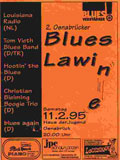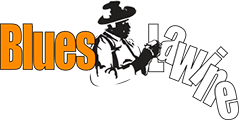 February 11th, 1995
February 11th, 1995
Christian Bleiming Boogie Trio
Hootin' The Blues
Tom Vieth Blues Band
Louisiana Radio
Blues again ...
A forum for less popular styles
The second Blueslawine with bands from Münster,
Osnabrück and Holland in the Haus der Jugend
One must congratulate the Osnabrück Bluesverstärker for the programme they put together for their second festival. A colourful mixed programmed awaited the public with the most varied blues styles that memorably demonstrated the many-sidedness of black American music. In a time when in many places Chicago blues is seen as the non plus ultra this invitation to a musical voyage of discovery was an important step towards making not such popular styles known. The public interest showed that the Osnabrück initiative had chosen the right path.
The richly varied evening began with the Boogie king of Münster, Christian Bleiming and his trio. With rolling piano licks and a rather jazzy boogie style the pianist showed that Ellington and Gershwin can be boogified, and his supporters, Thomas Schneller on saxophone and Peter Samland on drums did the necessary as accompaniment and gave the impression that it was poured smoothly out of a jug. Scneller and Bleiming split the solo and thematic work with fiery improvisation duels, while Peter Samland as the solid driving engine on drums made himself noticed from time to time with explosive breaks.
After this lively beginning "Hootin' the Blues" showed the full spectrum of acoustic blues with their own compositions and standards from the 2os and 30s. Gerd Gorke on the blues harp set the tone and ensured that there would be spontaneous applause again and again with his solos. Günther Leidfeld-Strikkeling and Rupert Pfeiffer produced a stylish and sensitive istrumentation with dobro, guitar and mandoline and in the country blues the dobro was played with the bottleneck or, in standards like "The Thrill is Gone" a funky modern note was set.
Finally it was time for the local matadors of the evening, The "Tom Vieth Blues Band" and their Chicago blues. Here one noticed the excellently fine-honed rhythm group consisting of drummer Frank Heitkämper, the base player Erkan Özdemir and the guitarist Kai "Candy" Strauss. With enormous power and secure in the saddle playing together they guaranteed the dynamic Chicago sound that the band summoned up on the stage. And on top this Thomas Vieth had enough chance to present himself as guitarist and singer.
As guest there was also the saxophonist Thomas Feldmann, who, together with Thomas Vieth , again and again set the tone for the solos.However, one must put brackets around the pieces that were written by the group themselves. They sounded sometimes too naïve and too derivative to develop their own life. Otherwise The Tom Vieth Blues Band also offered a pleasant program in which there are certainly many possibilities for development.
Zydeco and Calun with the Dutch Band "Louisiana Radio" were the last item in the program of the blues night. The houseband of the Utrecht Calun Café led the listener with their authentic instrumentation into the swamps of the Mississipi Delta and turned the rest of the evening into a dance festival,. From big city music from New Orleans in the manner of Dr. John through the country blues of "Canned Heat" to folklore dance numbers of Zydeco and Cajun the Dutchmen enabled one to hear the entire musical world of Louisiana, coupled with a dynamic stage show that quickly broke the ice with the public.
One felt transposed into the world of the Creoles when the accordion sounded or the drummer Arthur Bont reached for the washboard. The concert form "Louisiana Radio" is a expressive demonstration of a musical melting pot that from many points of view is unique in the world. Appropriately delighted the audience applauded the quintet which brought the 2. Osnabrucker blueslawine to an atmospherically successful end.
The duo „Blues again" bridged the intervals in the foyer, but this arrangement should be scrapped in future. The noise here made almost all conversation impossible and deprived the public of a break. The musicians in the foyer also deserved more attention, but this could not be achieved because of the forced over-feeding.
Ralf Gravemann, NOZ on 14. February 1995
Translation: Dennis Newson
(Photos: Eric Schäfer)

 DE
DE